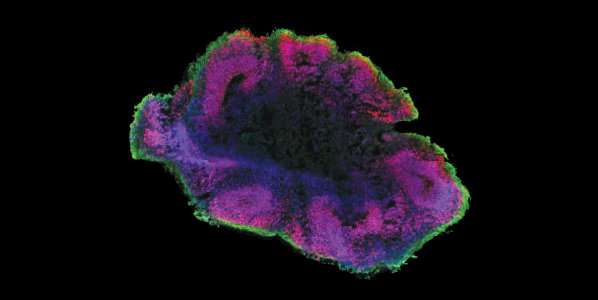November 9, 2017 report
Two teams implant human organoids into rodent brains sparking ethical debate

(Medical Xpress)—Two teams of researchers have reportedly implanted human organoids into mice and rat brains, setting off what it likely to be a heated debate about the ethical implications of such research. Statnews is reporting that one of the teams was led by Fred Gage of the Salk Institute, though there are few other details. The other team, led by Isaac Chen with the University of Pennsylvania, has reportedly implanted human organoids into the visual cortices of 11 rats that subsequently underwent testing. Both teams are scheduled to give presentations surrounding their work at this year's Society for Neuroscience meeting.
Organoids are smaller, less complex versions of biological organs. They are synthesized via manipulation of tissue, embryonic stem cells, or induced pluripotent stem cells. They grow, self-organizing into tissue that strongly resembles normal human tissue. Scientists grow them to use for study purposes, such as noting the impact that a proposed medication will have on them. A brain organoid is, as the name implies, a biological structure with brain characteristics. Some are little more than a collection of neurons, but others are much more complex, developing brain parts that are similar to fully formed brains. Up until now, research using brain organoids has been confined to petri dishes, but that, many in the field contend, is limiting, because the organoids cannot reach their full potential in such an environment—they need to be placed inside of a living organism. And that is apparently what two teams in the U.S. have done.
What is most striking about news of human organoids implanted into the brains of other animals is the means by which it occurred—without oversight from governmental agencies. The science is still so new that entities such as the National Institutes of Health have not had a chance to work out whether such research should be monitored, restricted or outlawed altogether. By presenting their work, the two teams will likely set off discussions in many corridors regarding whether such research is ethical, especially in light of some of the reported findings—such as shining a light in the eyes of the test rats to induce neural activity in the implanted organoid. There is also an unsubstantiated rumor that another team in the U.S. has been conducting similar research and has found a way to connect a blood supply to an implanted brain organoid, potentially allowing it to grow even more complex.
© 2017 Medical Xpress














